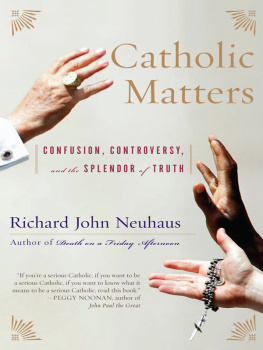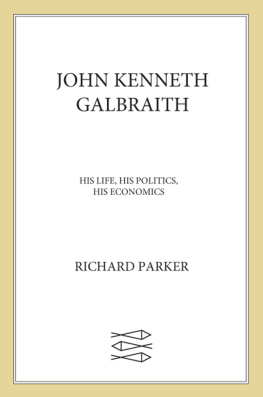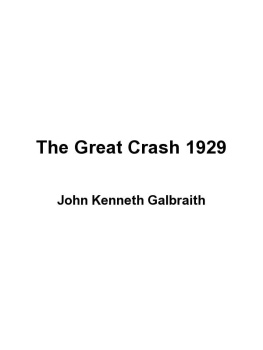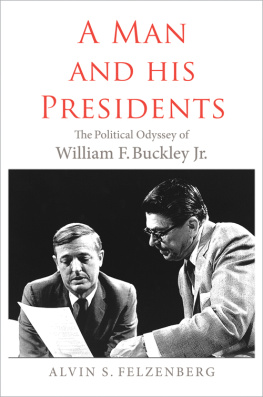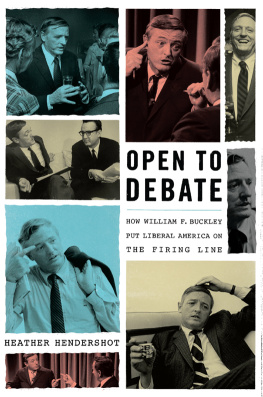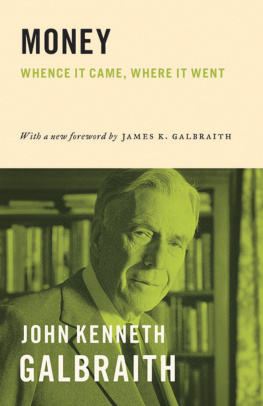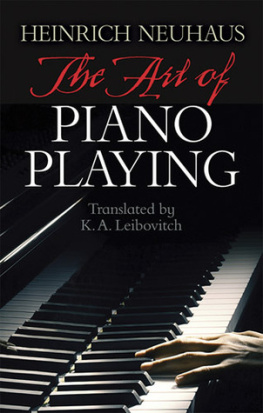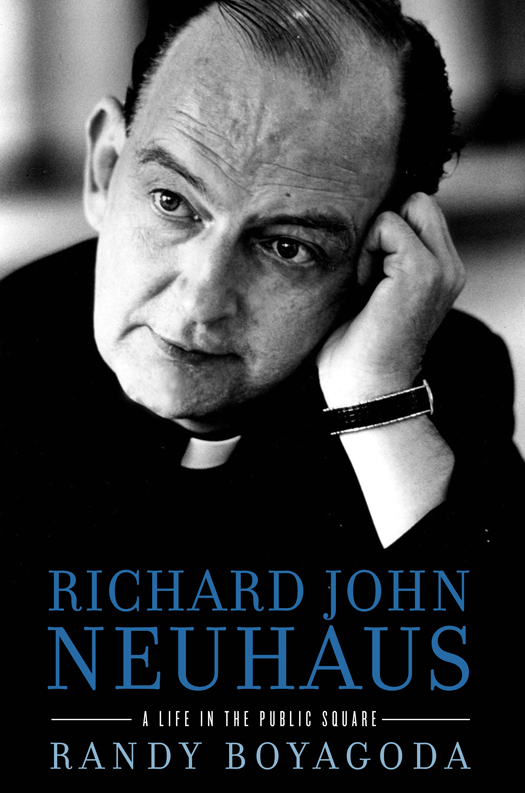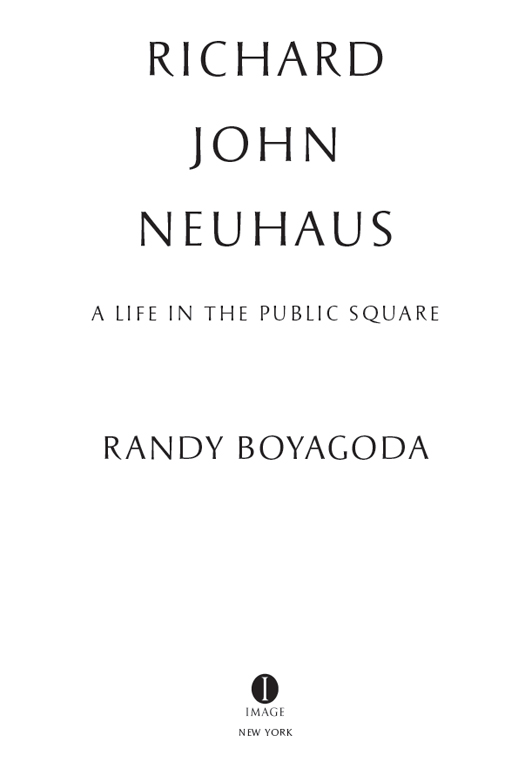Praise for Richard John Neuhaus
Deeply researched, lucidly written.
New York Times
In Richard John Neuhaus: A Life in the Public Square, Randy Boyagoda captures his subjects deep sense of vocation and the complexity of his personality, offering a comprehensive biography and, along the way, a thoughtful introduction to some of the culture wars of the past several decades.
Wall Street Journal
[A] stellar biography.
Publishers Weekly
Boyagoda dispassionately describes this fascinating and active life, and he manages to blend skills as a folksy storyteller, researcher and unbiased historian, providing a biography that is balanced, interesting and relevant. A useful, provocative spotlight on one of the leading lights of the twentieth century.
Kirkus Reviews
[A] page-turner.
National Review
Boyagodas biography is an invaluable account of the political and ecclesiastical controversies in which Neuhaus played a central, influential and controversial role.
America magazine
A wonderful biography.
Raymond Arroyo, New York Times bestselling author and host, EWTNs The World Over
Boyagoda persuasively argues that Neuhaus was a charismatic leader and original thinker whose contributions to American culture and politics make him someone worth knowing about.
The American Conservative
Boyagodas luminously intelligent study of the man makes clear that Richard John Neuhaushowever one regards his politicsdeserved his place in a long line of memorable American preacher politicians.
National Post
Neuhaus was a hugely influential figure, and Boyagoda tells his story with novelistic empathy and narrative panache.
The Globe and Mail
Boyagoda found the Neuhaus I knew, complete with all the mans winsome qualities and not a few of his contradictions. Not surprisingly, he also revealed facets of the man I could never guess.
Russell E. Saltzman, Aleteia
And up until now, no one has offered a more credible, careful, and colorful biography of this convert to Catholicism.
Cardinal Timothy M. Dolan, Archbishop of New York, author of True Freedom
Thorough, vivid, and keenly understanding of the interplay of personality, faith, and cultural context, Boyagodas biography of Neuhaus does justice to this man of faith.
Carl A. Anderson, Supreme Knight, Knights of Columbus
Until his death in 2009, Father Richard John Neuhaus was a powerhouse in American public life and a monument in American Catholic history. Randy Boyagoda, an extraordinary author best known for his work in fiction, knew that someone had to tell Fr. Neuhaus storyand that it deserved to be told well.
CatholicVote.org
Copyright 2015 by Randy Boyagoda
All rights reserved.
Published in the United States by Image, an imprint of the Crown Publishing Group, a division of Random House LLC, a Penguin Random House Company, New York.
www.crownpublishing.com
IMAGE is a registered trademark and the I colophon is a trademark of Random House LLC.
Library of Congress Cataloging-in-Publication Data
Boyagoda, Randy, 1976
Richard John Neuhaus : a life in the public square /
Randy Boyagoda. First Edition.
pages cm
Includes bibliographical references.
1. Neuhaus, Richard John. 2. CatholicsUnited StatesBiography. I. Title. BX4705.N426B69 2015
282.092dc23
[B] 2014034028
ISBN 978-0-307-95396-4
eBook ISBN 978-0-307-95397-1
Jacket photograph: St. PetersburgTimes/ZUMAPRESS.com/Jonathan Wiggs
v3.1_r1
F OR A NNA , M IRA , O LIVE , E VER , AND I MOGEN ,
MY FIRST AND BEST THINGS
We have to see that the priest as priest is a public person, that he is a political person.
R ICHARD J OHN N EUHAUS , 1967
Preface
There was smoke and ash and great singing in the church that night in 1967. The pews were filled with left-wing radicals and their marijuana and cigarettes. They had come over from Manhattan to a broken-down corner of Brooklyn, along with some television cameras and reporters, for A Service of Conscience and Hope, an event that yoked prayer and protest over the grave injustice of the U.S. war effort in Vietnam. During its signal moment, some two hundred young men solemnly walked to the altar bearing their draft cards, which they deposited in a bowl. This was their symbolic and efficacious means of refusing to join the American war machine: following the service, the cards would be sent on to the Justice Department. The young men walked forward amid much sixties-era atmospherics, but the church was far from silent. The long-haired people on the scored wooden benches were singing with everything they had, but this time, they were not running through one of their standard angry protest chants, or cooing the latest soft-melt folk paean to peace. They were singing America the Beautiful, following the deep-voiced man of God presiding over the service, thirty-one-year-old Richard John Neuhaus.
He was the pastor at St. John the Evangelist, the thriving Lutheran church hosting the event; he was also one of the founders of a leading antiwar group, Clergy and Laity Concerned About Vietnam, and a fast-rising intellectual and activist on the American Left. But this trajectory would never be finally or fully his trajectory. The song he wanted his fellow antiwar activists to sing at St. John the Evangelist indicated as much: as he would later recount, his suggestion was met with silence, even shock. Asking this particular gathering to sing that particular song was basically like asking Billy Graham and Bob Hope to sing Communist anthems at an Honor America rally. Neuhaus, however, was convinced prayer and protest could be joined to patriotism; in fact, at difficult and fraught times in American public life, they had to be, whether to rescue love of country from war-making scoundrels and other ugly conservatives, or to remind myopic pacifists and other sweet, dreamy liberals that they were citizens called by God and by history to love and help redeem their troubled nation, not hate it and abandon it to its hateful elements. And so this was why, as far as he was concerned, nothing less than America the Beautiful had to sound forth in the church while all the young men said no to what their country was doing in Vietnam. Pastor Neuhaus preached to the hazy protestors in the hazy pews that the song did not describe the United States as it was. He told them it described the United States they all hoped for, the nation they hoped would come into existence because of the very acts of conscientious objection that they were committing together in the church that night. Provocative, contrarian, challenging, persuasiveNeuhaus won them over. What came of it, as New York TV news audiences and newspaper readers learned the next day, and he would observe in one of his many books, was the lustiest and most heartfelt rendition of America the Beautiful I have ever heard.
Almost thirty years later, amid all the cheering and applause, it was everything Father Richard John Neuhaus could do to stop his admiring audience from belting out songs like America the Beautiful. He was in Washington to speak at the annual Road to Victory convention in September 1994, two months before the midterm elections. The event was sponsored by the Christian Coalition, a political operation dedicated to securing conservative Christian voters for the Republican Party by persuading them to put their electoral trust in the GOP. The three thousand in attendance were certainly open to the proposition: as far as many conservative Christians in America were concerned, their beloved and God-blessed nation was now run by godless, decadent liberals and, unsurprisingly, going to hell. Public schools taught lefty nonsense and anti-American garbage in place of sound values and strong traditions; popular culture was a sex-encrusted cesspool; you could abort your unborn child and claim it as a constitutional right more easily than you could quote the Bible at a public meeting or put up a crche at city hall. Something had to be done about all of thisnamely, get the right kind of people elected to public officeand if you were a delegate at a Christian Coalition conference, the right kind of people were Republicans. The coming election, however, would not be easy; the attendees needed encouragement, even blessings, for their effort to turn out fellow churchgoers on Election Day. And who better to do it than the author of the national bestseller




